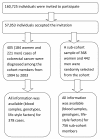Polymorphisms in NFkB, PXR, LXR and risk of colorectal cancer in a prospective study of Danes - PubMed (original) (raw)
Polymorphisms in NFkB, PXR, LXR and risk of colorectal cancer in a prospective study of Danes
Vibeke Andersen et al. BMC Cancer. 2010.
Abstract
Background: Transcription factors and nuclear receptors constitute a link between exposure to heterocyclic amines and polycyclic aromatic hydrocarbons from meat and tobacco smoke and colorectal cancer (CRC) risk. The aim of this study was to investigate if polymorphisms in nuclear factor kappa-B, pregnane X receptor, and liver X receptor were associated with risk of CRC, and to investigate possible interactions with lifestyle factors such as smoking, meat consumption, and NSAID use.
Methods: The polymorphisms nuclear factor kappa-B (NFkB, NFKB1) -94 insertion/deletion ATTG (rs28362491), pregnane X receptor (PXR, NR1I2) A-24381C (rs1523127), C8055T (rs2276707), A7635G (rs6785049), liver X receptor (LXR-β, NR1H3) C-rs1405655T, T-rs2695121C were assessed together with lifestyle factors in a nested case-cohort study of 378 CRC cases and 756 random participants from the Danish prospective Diet, Cancer and Health study of 57,053 persons.
Results: Carriers of NFkB -94deletion were at 1.45-fold higher risk of CRC than homozygous carriers of the insertion allele (incidence rate ratio (IRR) = 1.45, 95% confidence interval (95% CI): 1.10-1.92). There was interaction between this polymorphism and intake of red and processed meat in relation to CRC risk. Carriers of NFkB -94deletion were at 3% increased risk pr 25 gram meat per day (95% CI: 0.98-1.09) whereas homozygous carriers of the insertion were not at increased risk (p for interaction = 0.03). PXR and LXR polymorphisms were not associated with CRC risk. There was no interaction between use of nonsteroid antiinflammatory drugs (NSAID) or smoking status and NFkB, PXR or LXR polymorphisms.
Conclusions: A polymorphism in NFkB was associated with CRC risk and there was interaction between this polymorphism and meat intake in relation to CRC risk. This study suggests a role for NFkB in CRC aetiology.
Figures
Figure 1
A flow chart showing the selection of study subjects. Between December 1993 and May 1997, 160,725 individuals aged 50 to 64 years, born in Denmark, living in the Copenhagen and Aarhus areas and having no previous cancers at the time of invitation, were invited to participate in the study. Please refer to Methods for further details.
Similar articles
- Polymorphisms in NF-κB, PXR, LXR, PPARγ and risk of inflammatory bowel disease.
Andersen V, Christensen J, Ernst A, Jacobsen BA, Tjønneland A, Krarup HB, Vogel U. Andersen V, et al. World J Gastroenterol. 2011 Jan 14;17(2):197-206. doi: 10.3748/wjg.v17.i2.197. World J Gastroenterol. 2011. PMID: 21245992 Free PMC article. - Polymorphisms in the xenobiotic transporter Multidrug Resistance 1 (MDR1) and interaction with meat intake in relation to risk of colorectal cancer in a Danish prospective case-cohort study.
Andersen V, Ostergaard M, Christensen J, Overvad K, Tjønneland A, Vogel U. Andersen V, et al. BMC Cancer. 2009 Nov 21;9:407. doi: 10.1186/1471-2407-9-407. BMC Cancer. 2009. PMID: 19930591 Free PMC article. - Role of PPAR, LXR, and PXR in epidermal homeostasis and inflammation.
Schmuth M, Moosbrugger-Martinz V, Blunder S, Dubrac S. Schmuth M, et al. Biochim Biophys Acta. 2014 Mar;1841(3):463-73. doi: 10.1016/j.bbalip.2013.11.012. Epub 2013 Dec 3. Biochim Biophys Acta. 2014. PMID: 24315978 Review. - BAREing it all: the adoption of LXR and FXR and their roles in lipid homeostasis.
Edwards PA, Kast HR, Anisfeld AM. Edwards PA, et al. J Lipid Res. 2002 Jan;43(1):2-12. J Lipid Res. 2002. PMID: 11792716 Review.
Cited by
- Contributions of NFKB1 -94insertion/deletion ATTG polymorphism to the susceptibility of gastrointestinal cancers: A meta-analysis.
Wu H, Liang J. Wu H, et al. J Cell Mol Med. 2021 Nov;25(22):10674-10683. doi: 10.1111/jcmm.17004. Epub 2021 Oct 21. J Cell Mol Med. 2021. PMID: 34672421 Free PMC article. - Germline Genetic Variants of Viral Entry and Innate Immunity May Influence Susceptibility to SARS-CoV-2 Infection: Toward a Polygenic Risk Score for Risk Stratification.
Grolmusz VK, Bozsik A, Papp J, Patócs A. Grolmusz VK, et al. Front Immunol. 2021 Mar 8;12:653489. doi: 10.3389/fimmu.2021.653489. eCollection 2021. Front Immunol. 2021. PMID: 33763088 Free PMC article. Review. - Inherited variant in NFκB-1 promoter is associated with increased risk of IBD in an Algerian population and modulates SOX9 binding.
Hamadou I, Garritano S, Romanel A, Naimi D, Hammada T, Demichelis F. Hamadou I, et al. Cancer Rep (Hoboken). 2020 Jun;3(3):e1240. doi: 10.1002/cnr2.1240. Epub 2020 Feb 20. Cancer Rep (Hoboken). 2020. PMID: 32671985 Free PMC article. - Exploratory Genome-Wide Interaction Analysis of Nonsteroidal Anti-inflammatory Drugs and Predicted Gene Expression on Colorectal Cancer Risk.
Wang X, Su YR, Petersen PS, Bien S, Schmit SL, Drew DA, Albanes D, Berndt SI, Brenner H, Campbell PT, Casey G, Chang-Claude J, Gallinger SJ, Gruber SB, Haile RW, Harrison TA, Hoffmeister M, Jacobs EJ, Jenkins MA, Joshi AD, Li L, Lin Y, Lindor NM, Marchand LL, Martin V, Milne R, Maclnnis R, Moreno V, Nan H, Newcomb PA, Potter JD, Rennert G, Rennert H, Slattery ML, Thibodeau SN, Weinstein SJ, Woods MO, Chan AT, White E, Hsu L, Peters U. Wang X, et al. Cancer Epidemiol Biomarkers Prev. 2020 Sep;29(9):1800-1808. doi: 10.1158/1055-9965.EPI-19-1018. Epub 2020 Jul 10. Cancer Epidemiol Biomarkers Prev. 2020. PMID: 32651213 Free PMC article. - Intake of Red and Processed Meat, Use of Non-Steroid Anti-Inflammatory Drugs, Genetic Variants and Risk of Colorectal Cancer: A Prospective Study of the Danish "Diet, Cancer and Health" Cohort.
Andersen V, Halekoh U, Tjønneland A, Vogel U, Kopp TI. Andersen V, et al. Int J Mol Sci. 2019 Mar 5;20(5):1121. doi: 10.3390/ijms20051121. Int J Mol Sci. 2019. PMID: 30841568 Free PMC article.
References
- World Resources Institue, Earth Trends, The environmental information portal. 2009. http://earthtrends.wri.org/ Ref Type: Internet Communication.
- World Cancer Research Fund/American Institute for CancerResearch FNPAatoCaGPA. Washington, DC; 2007. http://www.dietandcancerreport.org/ Ref Type: Internet Communication.
Publication types
MeSH terms
Substances
LinkOut - more resources
Full Text Sources
Medical
Research Materials
Miscellaneous
